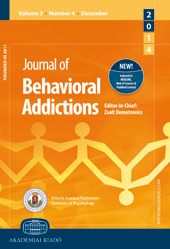Retrospective and prospective assessments of gambling-related behaviors across the female menstrual cycle
Retrospective and prospective assessments of gambling-related behaviors across the female menstrual cycle
Author(s): Kayla M. Joyce, Amanda Hudson, Roisin M. O'ConnorSubject(s): Behaviorism
Published by: Akadémiai Kiadó
Keywords: gambling; alcohol consumption; menstrual cycle; female; self-medication; reward sensitivity
Summary/Abstract: Background and aims. Despite increases in female gambling, little research investigates female-specific factors affecting gambling behavior (GB). Although research suggests that some addictive behaviors may fluctuate across menstrual cycle phase (MCP), gambling requires further investigation. In two studies, we examined associations between MCP and three risky GBs: time spent gambling, money spent gambling, and the probability of consuming alcohol while gambling. Associations between MCP and negative affect were also examined in Study 2. We predicted that, consistent with self-medication theory, increases in negative affect (Study 2) and risky GBs (Studies 1 and 2) would occur premenstrually/menstrually relative to other phases. Methods. Data were obtained from 33 female gamblers using a retrospective timeline followback procedure (Study 1) and from 20 female gamblers using a prospective 32-day, daily diary method (Study 2). In Study 2, salivary progesterone levels verified self-reported MCP validity. Results. Findings revealed significant, but somewhat inconsistent, MCP effects on GBs across studies. The self-medication hypothesis was partially supported. Increases relative to another MCP(s) were found for alcohol consumption while gambling premenstrually, time spent gambling menstrually/premenstrually, money spent gambling menstrually, and negative affect premenstrually. Unexpectedly, findings more consistently indicated that GBs increased during ovulation, suggestive of enhanced reward sensitivity. Progesterone assays validated self-reported MCP (Study 2). Discussion and conclusions. The results suggest a role of ovarian hormones on negative affect and GBs in females. This research could lead to the identification of female-specific factors affecting gambling and the development of more effective interventions for females with, or at risk for, problematic gambling.
Journal: Journal of Behavioral Addictions
- Issue Year: 8/2019
- Issue No: 1
- Page Range: 135-145
- Page Count: 11
- Language: English

